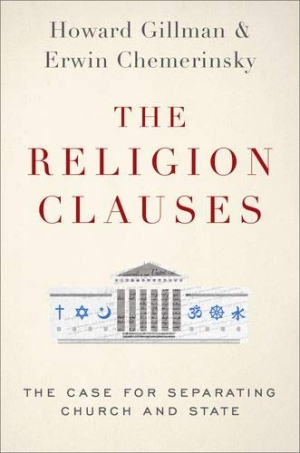The Religion Clauses
The Case for Separating Church and State
Thorough research is apparent in Erwin Chemerinsky and Howard Gillman’s The Religion Clauses, a deep monograph about the correctness of the separation of church and state.
Both a history of the US Constitution and Supreme Court rulings regarding religious liberty, and a polemic supporting state secularism in the face of growing Christian conservatism, the book examines the strands of state-church separation in depth, parceling opposing ideas out in subchapters. The concerns of the Founding Fathers in regards to religion are discussed alongside what the Constitution resolved and did not resolve in that respect, while other viewpoints on the relationship of religion and the state in the eighteenth century, including William Blackstone’s English common law philosophy and Oliver Cromwell’s Commonwealth, are discussed at length.
The text focuses on legal theories, legalese, and legal scholarship, but it is direct and absent legal jargon. Still, it will be harder for those outside of legal professions to understand this work, though its concise history of the place of religion in the US Constitution and the Bill of Rights is clear. The book’s arguments about the dangers of establishing a state church or a national religion are thorough, too.
Conflicting issues, as with the differences between state secularism and laïcité, or the French ban on all public religiosity, are raised. The book’s explicit support for church and state separation is forwarded under the banner of multiculturalism and tolerance, though the question of how different religions view the state is not addressed. Otherwise, the book is exhaustive in detailing the different ways in which the Constitution supports state secularism.
The Religion Clauses is a thorough primer on law and religion in the US—issues that could be at the center of political debates in the coming years.
Reviewed by
Benjamin Welton
Disclosure: This article is not an endorsement, but a review. The publisher of this book provided free copies of the book to have their book reviewed by a professional reviewer. No fee was paid by the publisher for this review. Foreword Reviews only recommends books that we love. Foreword Magazine, Inc. is disclosing this in accordance with the Federal Trade Commission’s 16 CFR, Part 255.

